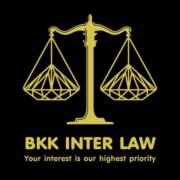Best Communications & Media Law Lawyers in Don Mueang
Share your needs with us, get contacted by law firms.
Free. Takes 2 min.
List of the best lawyers in Don Mueang, Thailand
About Communications & Media Law in Don Mueang, Thailand
Communications and Media Law in Don Mueang, Thailand, refers to the legal frameworks that govern broadcasting, telecommunications, digital media, print media, and online content. These laws are in place to protect free expression while balancing concerns such as national security, public order, morals, and personal rights. Don Mueang, being a significant district of Bangkok, is subject to both national regulations and local administrative requirements. Businesses, individuals, journalists, broadcasters, advertisers, and content creators operating in Don Mueang must comply with various rules regarding licensing, content control, intellectual property, consumer protection, and personal data privacy.
Why You May Need a Lawyer
People often seek legal assistance in the field of Communications and Media Law in Don Mueang for several reasons:
- Starting a media or broadcasting business and navigating licensing requirements
- Defending against accusations of defamation, slander, or libel
- Dealing with allegations of copyright infringement or unauthorized content use
- Ensuring compliance with advertising and consumer protection laws
- Responding to governmental requests regarding content takedown or digital evidence
- Protecting personal data and privacy rights online
- Litigating or mediating disputes related to telecommunications and internet service
- Understanding restrictions on political, religious, or sensitive content
A communications and media lawyer can help interpret complex legal language, represent clients in court or negotiations, and provide strategic advice tailored to both local and national regulations.
Local Laws Overview
Don Mueang follows national Thai laws relevant to communications and media, which are enforced by local authorities. Key legal instruments include the Computer Crime Act, the Broadcasting and Television Business Act, the Personal Data Protection Act, the Copyright Act, and the Film and Video Act. Important considerations for those operating in Don Mueang are:
- Content Regulation: Content deemed defamatory, offensive to the monarchy (lèse-majesté), or contrary to public morals is strictly prohibited. Content moderation is actively enforced.
- Licensing Requirements: Broadcast and telecommunications businesses must hold valid licenses from relevant regulators, such as the National Broadcasting and Telecommunications Commission (NBTC).
- Digital Media Oversight: Online content providers must comply with the Computer Crime Act, which addresses issues such as fake news, cyber threats, and unlawful online material.
- Advertising Law: Advertising must not mislead consumers and must comply with standards set by local authorities and the Consumer Protection Board.
- Data Privacy: Collecting, storing, and using personal data requires adherence to the Personal Data Protection Act, ensuring data subject's rights are respected.
- Intellectual Property: Reproduction or distribution of protected works without consent can lead to criminal and civil liability.
These laws are continually updated, especially with the growth of digital and online communications, so staying informed is essential.
Frequently Asked Questions
What types of content are prohibited under Thai law?
Content that is defamatory, violates personal rights, is considered a threat to national security, offends the monarchy, or is against public morals and order is strictly prohibited and can be subject to removal or prosecution.
Do I need a license to run a community radio station or online streaming service?
Yes, both community radio stations and online streaming services may require licenses from the National Broadcasting and Telecommunications Commission in compliance with local and national laws.
Can I be sued for comments made on social media?
Yes, individuals can face civil or criminal action for defamatory or false statements made online, including on personal or business social media accounts.
Is it possible to appeal against a content removal or blocking order?
Yes, it is possible to challenge or appeal government-ordered content removal, but the process can be complex and legal support is often recommended.
How are copyright and trademark issues handled in Don Mueang?
Copyright and trademark infringement is subject to enforcement under the Copyright Act and Trademark Act, with remedies including fines, damages, and criminal penalties.
What should media companies do to protect personal data?
Media companies must comply with the Personal Data Protection Act by implementing policies to protect personal information, obtaining consent, and allowing subjects to access or correct their data.
What risks do journalists face when reporting sensitive matters?
Journalists reporting on politics, religion, or royal affairs must exercise extreme caution to avoid violating laws on lèse-majesté, national security, or public order, which can carry severe penalties.
What are the penalties for violating media laws in Don Mueang?
Penalties range from fines and content removal to imprisonment, depending on the severity and nature of the violation, especially for offenses relating to national security or the monarchy.
Can foreign media companies operate in Don Mueang?
Foreign media companies must meet requirements set by Thai authorities, obtain necessary permits, and often need to work with a local partner or representative.
How can I respond to a government investigation involving my media business?
It is essential to seek legal representation immediately, collect all relevant documentation, and cooperate with authorities within the bounds of the law and your rights.
Additional Resources
If you need more information or support regarding Communications and Media Law in Don Mueang, the following resources may be helpful:
- National Broadcasting and Telecommunications Commission (NBTC) - Regulates broadcast and telecom businesses
- Department of Intellectual Property (DIP) - Handles copyright and trademark matters
- Office of the Personal Data Protection Commission - Responsible for enforcing the PDPA
- Consumer Protection Board - Manages advertising and consumer-related complaints
- Ministry of Digital Economy and Society - Oversees digital and online content regulations
- Thai Journalists Association - Support and advocacy for media professionals
- Legal aid clinics in Bangkok - Provide assistance for those who qualify
Next Steps
If you believe you need legal help with a Communications or Media Law issue in Don Mueang:
- Evaluate your situation and note any details, correspondence, or documentation
- Consult with a qualified communications and media lawyer familiar with local laws
- Ask about the lawyer's experience with similar cases and local authorities
- Work closely with your lawyer to prepare any required documentation or responses
- Stay informed about your obligations and the possible outcomes of your case
- If necessary, utilize the additional resources and regulatory authorities mentioned above
Being proactive, seeking professional advice early, and understanding your legal rights and responsibilities will help you navigate Communications and Media Law issues in Don Mueang with greater confidence.
Lawzana helps you find the best lawyers and law firms in Don Mueang through a curated and pre-screened list of qualified legal professionals. Our platform offers rankings and detailed profiles of attorneys and law firms, allowing you to compare based on practice areas, including Communications & Media Law, experience, and client feedback.
Each profile includes a description of the firm's areas of practice, client reviews, team members and partners, year of establishment, spoken languages, office locations, contact information, social media presence, and any published articles or resources. Most firms on our platform speak English and are experienced in both local and international legal matters.
Get a quote from top-rated law firms in Don Mueang, Thailand — quickly, securely, and without unnecessary hassle.
Disclaimer:
The information provided on this page is for general informational purposes only and does not constitute legal advice. While we strive to ensure the accuracy and relevance of the content, legal information may change over time, and interpretations of the law can vary. You should always consult with a qualified legal professional for advice specific to your situation.
We disclaim all liability for actions taken or not taken based on the content of this page. If you believe any information is incorrect or outdated, please contact us, and we will review and update it where appropriate.









